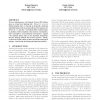Free Online Productivity Tools
i2Speak
i2Symbol
i2OCR
iTex2Img
iWeb2Print
iWeb2Shot
i2Type
iPdf2Split
iPdf2Merge
i2Bopomofo
i2Arabic
i2Style
i2Image
i2PDF
iLatex2Rtf
Sci2ools
105
click to vote
OSDI
2008
ACM
2008
ACM
An Internet Protocol Address Clustering Algorithm
We pose partitioning a b-bit Internet Protocol (IP) address space as a supervised learning task. Given (IP, property) labeled training data, we develop an IP-specific clustering algorithm that provides accurate predictions for unknown addresses in O(b) run time. Our method offers a natural means to penalize model complexity, limit memory consumption, and is amenable to a non-stationary environment. Against a live Internet latency data set, the algorithm outperforms IP-na?ive learning methods and is fast in practice. Finally, we show the model's ability to detect structural and temporal changes, a crucial step in learning amid Internet dynamics.
Internet Latency Data | IP-specific Clustering Algorithm | Operating System | OSDI 2008 | Supervised Learning Task |
Related Content
| Added | 03 Dec 2009 |
| Updated | 03 Dec 2009 |
| Type | Conference |
| Year | 2008 |
| Where | OSDI |
| Authors | Robert Beverly, Karen R. Sollins |
Comments (0)

